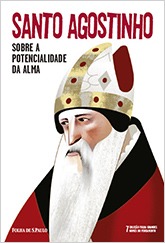- Bible
- Read the Bible
- Bible Versions
- Verse of the Day
- Reading Plans
- Verses by Topic
- Books of the Bible
- Bible Images
- Study
- Commentaries
- Concordances
- Dictionaries
- Encyclopedias
- Sermons
- Bible Atlas & Maps
- BP Wiki
- Devotionals
- Today's Devotionals
- Light of the World
- All Devotionals
- Inspirational Quotes
- More
- Picture Quotes
- Videos
- Inspirational
- Bible Study
- What The Bible Says
- Bible Q&As
- Daily Bread
- Bible by Genre
- Bible Stories
- Random Bible Verse
- Community
- Store
Sobre a Potencialidade da Alma
by Augustine
Santo Agostinho (354-430) é o maior filósofo da Patrística, período que vai do início da Era Cristã até o século VII. A Patrística, assim denominada porque constitui a primeira grande construção filosófica realizada por pensadores cristãos, os chamados “pais ou padres da Igreja”, estabeleceu as bases de muito da trama conceitual que fará do cristianismo uma corrente filosófica consistente na história.
Grande polemista, Santo Agostinho foi essencial na criação de conceitos como graça, sacramento, história como processo de regeneração da humanidade, conhecimento como iluminação divina, livre-arbítrio, interioridade como lugar da verdade (a alma propriamente dita) em oposição à esterilidade do mundo exterior sem o aporte do conhecimento interior. Por isso é, de certa forma, o ancestral da psicologia profunda, além, é claro, de ser responsável direto pelo encontro entre a herança neoplatônica e o cristianismo.
Grande polemista, Santo Agostinho foi essencial na criação de conceitos como graça, sacramento, história como processo de regeneração da humanidade, conhecimento como iluminação divina, livre-arbítrio, interioridade como lugar da verdade (a alma propriamente dita) em oposição à esterilidade do mundo exterior sem o aporte do conhecimento interior. Por isso é, de certa forma, o ancestral da psicologia profunda, além, é claro, de ser responsável direto pelo encontro entre a herança neoplatônica e o cristianismo.
BUY NOW
Hardcover, 158 pages
Published June 2015 by Folha de S. Paulo
© 2025 Bibleportal.com All rights reserved.

Aurelius Augustinus - more commonly "St. Augustine of Hippo," or simply "Augustine" - was a philosopher and theologian, and one of the most important figures in the development of Western Christianity. He framed the concepts of original sin and just war. Augustine was one of the most prolific Latin authors in terms of surviving works, and the list of his works consists of more than a hundred separate titles.
Augustine took the view that the Biblical text should not be interpreted literally if it contradicts what we know from science and our God-given reason. Many Protestants, especially Calvinists, consider him to be one of the theological fathers of Reformation teaching on salvation and divine grace.
... Show more